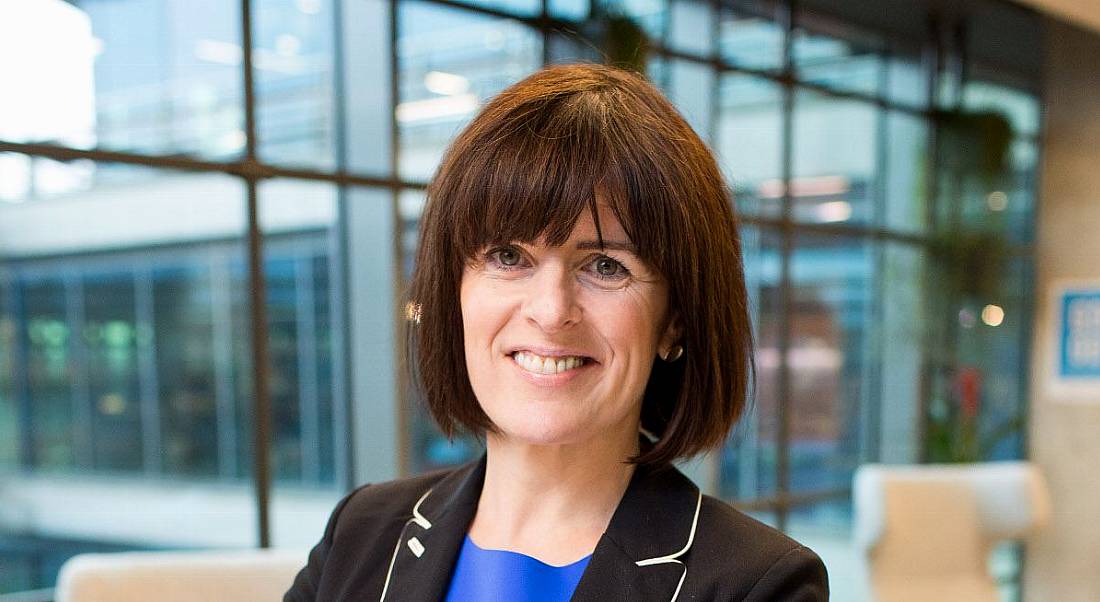Adrienne Gormley from Dropbox reveals how to navigate the future of work, deal with tech shortages and make millennials feel at home.
The seeming holy grail for those in the tech industry these days is unlocking the key to navigating the seismic shifts taking place in how people approach the workplace.
To gain some insight, we decided to chat to Adrienne Gormley, vice-president of customer experience at Dropbox.
Gormley’s team at Dropbox ensures that every interaction users have with the company is a great one. In addition to being the internal advocates for Dropbox’s customers, her team is responsible for troubleshooting customer issues and ensuring users fully maximise the versatility of their Dropbox and Dropbox Business accounts.
Gormley came over to Dropbox from Google, where she led international teams across a range of functions including sales, Google Maps and localisation. She also led Google Ireland’s women’s network.
Gormley continues to be deeply committed to diversity, and is an active member across diversity networks and organisations in Ireland. Here, she has given us her sage insight into how to navigate the future of work.
What challenges and opportunities face the workplace and workforce of the future?
A major trend we’re seeing is the shift towards more flexible working patterns. Workforces themselves are changing, becoming more dispersed with broader expertise. This is placing an onus on companies to support more collaborative working habits.
As competition for talent grows, particularly in the tech sector, attracting and retaining talent will present the biggest challenge to dynamic organisations. Focusing on the dual pillars of flexibility and collaboration will go a long way to enabling a happier workforce, leading in turn to more agile and creative organisations as a whole.
What key trends do you foresee in relation to intra-team behaviour, management employee interactions or other workplace dynamics?
A team now goes far beyond those within the office and, while face-to-face interaction will always be important, this is not always possible for mobile teams and larger global projects, particularly those that involve multiple stakeholders, languages and locations.
When it comes to building a successful modern team, collaborative networks are crucial to making sure all voices are heard.
The majority of organisations are already well on their way to becoming less hierarchical, with millennials expecting to interact with their managers on a much more personal level. There doesn’t need to be a divide between who you are and what you do in the workplace, and it’s our mission to unleash people’s creativity.
How will the workplace change as the Baby Boomers and Generation X age out of the workforce and it becomes millennial-driven?
Fundamentally, a business boils down to its people. It doesn’t matter what industry or location you’re in – millennials will change workplace culture.
The two main factors I’ve noticed when it comes to motivating this generation are career development and workplace attitude. This means it’s becoming more important to provide mentoring programmes that place an emphasis on personal development and progression.
Giving millennials the flexibility to work their way is key, whether that’s through hot-desking, working remotely, or using the tools and applications that suit their habits.
I expect opportunities for international travel and office rotation to soon be a standard request from millennials. Having great in-office perks certainly helps keep employees happy, too.
What part will diversion and inclusion play in the make-up of the workforce of the future?
Frankly, it’s already essential and its importance will only increase. The best ideas come from a diverse workforce, and creating an inclusive workplace makes for the happiest and most creative teams.
Organisations should have measures to promote diversity when hiring, and internal processes to ensure inclusion remains a focus and needs are being met. Having a diverse and inclusive global workforce is the first step to achieving this and, at Dropbox, we want to continue building on our efforts.
Work-life balance is arguably central to job satisfaction. How can it be better achieved?
We are all productive. We cram work into every minute possible and juggle our personal lives simultaneously. Sticking to some key boundaries can go a long way to ensuring you actually have time to think between all those daily tasks.
For instance, I rarely take meetings in the evening or weekends. Remember that it’s OK to push back when it comes to personal time and family.
I’m usually up at 6am to go for a run, before getting ready and helping my daughter prep for school. Either side of the day I’m navigating Dublin traffic, before spending time with my family in the evening and then logging on to check if there are any pressing things that I need to deal with.
With all that going on, it’s important to maintain certain boundaries and ensure you are making the most of every day. Ultimately, you have to make your career work for you.
We’ve seen immense increases in salaries, particularly in tech. Do you think salaries in your sector will trend upwards or will we start to see other benefits coming to the fore?
The tech sector is fighting for talent, particularly in hubs like San Francisco, Dublin and London, which has naturally led to a rise in salaries. That said, I think we’re seeing a step change in the wider tech sector to focus more on revenue generation and profitability, which should help to keep salaries at a reasonable level.
Attracting talent is only one side of the equation; retaining it is another, and this is where we will see other benefits take precedence.
I believe that vesting schedules for equity-based compensation will become more aggressive over time. Likewise, a company that caters toward more flexible working habits and collaborative practices will foster a much happier and dynamic workforce.
We’re currently deep in the world of data. What part will data play in developing the future of work?
It’s without doubt a game-changer. I believe that companies who invest in machine learning and advanced analytics to better understand not only their customers’ needs but also those of their workforce will vastly outperform their competitors.
At Dropbox, data is at the heart of everything we do, and using it to understand where to play, how to win and how to determine patterns of behaviour is a true competitive advantage that will only grow over time.
We’re looking at a more automated future, as AI and bots become more sophisticated. How do you think this will affect roles in your sector?
There is talk at the moment of machines and AI supplanting the workforce of the future, but this trend shouldn’t be feared – rather, embraced.
Machine learning will increasingly free up the time we now spend on tasks that make us less productive. In fact, it’s reported that we now spend 60pc of our capacity managing workloads versus actually delivering on them. We simply spend time being busy.
For all the talents machine learning possesses, it can never replace the spontaneity of human creativity and problem-solving. Conversations around the future workplace will therefore be focused less on process and more on creativity.
Intelligent bots and machines will let us essentially ‘outsource’ a lot of the more mundane and repetitive components of our work, giving us back time to actually think and innovate.
What are the sectors of the future? Where do you believe we will be seeing job growth and development?
Certainly robotics, particularly on the manufacturing and supply chain side. There are some impressive developments happening at companies like Alibaba and Amazon in warehouse automation, and we’ve only just scratched the surface on that front.
Transportation is one to watch as well, with large-scale infrastructure projects on the horizon. The likes of Tesla and Hyperloop One are making impressive strides forward, while others such as Volocopter on the drone side could soon be household names.
That being said, I see huge growth potential and value in connecting entire value chains across sectors, as this still remains a real challenge for a lot of companies. That’s why we created Dropbox Paper to act as the connective tissue between multiple teams and organisations.
Helping companies work more effectively and moving them beyond siloed environments is still a big opportunity for future growth.
What will companies need to do to attract and retain the best talent?
I believe there are four key components to both attracting and retaining talent you want. The first is to develop an inspirational mission that people want to follow; second, to provide the opportunities for continuous growth and development experiences; third, to hire exceptional people that you want to work with, and over time enable them to lead teams; and fourth, be competitive with your compensation and innovative with your benefits.
If you can cover each of these, then you’ll attract and develop people that truly want to work for the company.
How do companies need to change right now to be ready for the future of work you have envisioned here?
The key is to constantly evolve your organisation and be dynamic in the way that you approach new challenges.
The most immediate priority is shifting the conversation to reimagining the human experience at work. Listen to what your team wants and needs. Start by developing an understanding of your current capabilities and how they measure up to what your employees need to reach their potential.
Focus on culture and wider attitudes and prioritise getting that right above all else.
The tech sector is unique in that it moves at such a rapid pace. Flagship companies will be used increasingly as the blueprint to inspire the successful and creative teams of the future.
If Dropbox becomes one of them, that will be a great achievement.
Adrienne Gormley is the VP of customer experience at Dropbox.




